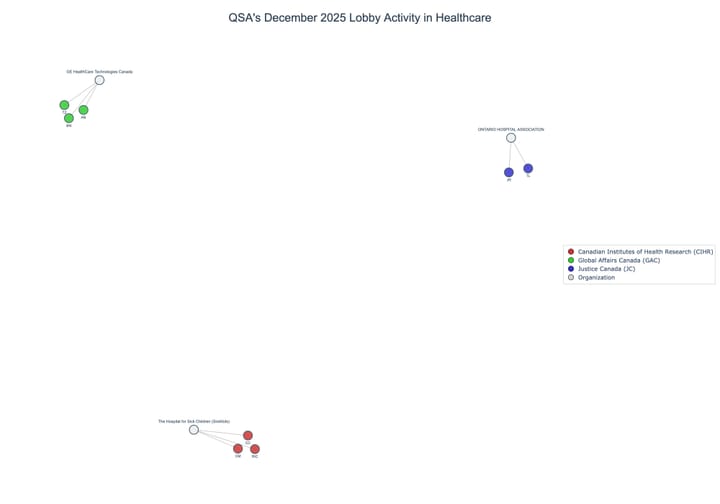QSA's Week in Healthcare (#44, 2025)
Supplementary Estimates seek $10.8B for health and dental care; Budget 2025 launches $5B Health Infrastructure Fund; Senate debates children and youth health strategy; StatsCan releases Veteran Health Survey data.

Good morning! This is Queen Street Analytics' weekly roundup of regulatory developments, legislative discussions, political announcements and other government-related news concerning biotech, pharmaceutical manufacturing, drug distribution and pricing, and the healthcare providers, doctors, physicians, clinicians, pharmacies and pharmacists that are making it all happen. Every Monday, we break down the most important updates in this space in under five minutes.
Dates: 2025-11-02 to 2025-11-08
📋 In This Week's Newsletter
• 🇨🇦 Canadian Federal Government News
• 🗺️ Canadian Provincial Government News
• 📚 What We're Reading This Week
Canadian Federal Government News
Federal Government Tables Supplementary Estimates (B) Featuring Major Health Allocations
The Treasury Board of Canada Secretariat tabled the Supplementary Estimates (B), 2025–26, seeking Parliament's approval for $10.8 billion in voted authorities across 76 organizations. As part of this tranche, Health Canada awaits $1.6 billion to support access to dental services under the Canadian Dental Care Plan. The Estimates also allocate significant funding to Indigenous Services Canada ($1.3 billion for emergency response reimbursement) and Crown-Indigenous Relations and Northern Affairs Canada ($1.4 billion for treaty negotiations). Immigration, Refugees and Citizenship Canada is requesting $621.2 million for the Interim Federal Health Program covering asylum seekers and refugees. Once passed, the new total for 2025–26 Estimates would reach $506.7 billion. Parliamentarians are expected to vote on the supply bill before December 10.
Sources: www.canada.ca

Budget 2025 Launches $5B Health Infrastructure Fund as Part of Build Communities Strong Program
Budget 2025 introduces the Build Communities Strong Fund, committing $51 billion over 10 years—with $3 billion annually ongoing—to upgrade key infrastructure, including hospitals, emergency rooms, and urgent care centers. Of this, $5 billion over three years is earmarked for a new Health Infrastructure Fund through the provincial and territorial stream. This dedicated funding aims to address upgrades in health facilities across the country. The program also provides $17.2 billion for provincial and territorial priorities in health care, education, and housing; $6 billion for regionally significant projects; and $27.8 billion for essential local infrastructure. This investment package is structured to boost capacity and reliability in Canada's health care facilities.
Sources: www.canada.ca
Budget 2025 Directs Funding for Health Infrastructure Across Canada’s Regions
Minister Mélanie Joly outlined the community impact of the Build Communities Strong Fund in Montréal-Nord. The $51 billion fund includes a provincial and territorial stream that provides $17.2 billion for health infrastructure upgrades—encompassing hospitals, emergency rooms, and urgent care centers—alongside education and housing projects. Regional initiatives will further benefit from $6 billion set aside for significant local projects and $27.8 billion for municipal essentials, with objectives to improve accessibility, efficiency, and reliability in the health and wellness sector.
Sources: www.canada.ca
Federal Investment Supports Health Facility Upgrades in British Columbia
Housing and Infrastructure Minister Gregor Robertson highlighted an investment of up to $25 million for a new multi-purpose Concert and Performance Hall at the Langley Events Centre, funded through the Green and Inclusive Community Buildings program. The project features a net-zero, energy-efficient design and is part of the broader Build Communities Strong Fund. The spending package also includes a $5 billion Health Infrastructure Fund for upgrades to health care facilities across the country, aiming to modernize hospitals and enhance public health amenities.
Sources: www.canada.ca
StatsCan Publishes Data on Canadian Veteran Health and Civilian Transition
Statistics Canada released findings from the 2024 Canadian Veteran Health Survey, detailing factors that influence the transition from military to civilian life, including data on general health, chronic health conditions, and labour force participation among veterans. The survey indicates varied experiences during this transition and identifies several factors that contribute to more successful integration outside military service.
Sources: www.statcan.gc.ca
Build Communities Strong Fund Set to Upgrade Health Facilities in Ontario, Alberta, Saskatchewan
In Hamilton, Minister Gary Anandasangaree reaffirmed the federal government’s commitment to infrastructure renewal via the Build Communities Strong Fund. The fund’s health stream allocates $5 billion over three years to modernize hospitals nationwide, including emergency and urgent care settings. This is part of a broader $51 billion commitment over 10 years, targeting priority infrastructure to improve service delivery, patient flow, and sector capacity.
Sources: www.canada.ca
Federal Funding Supports Health Infrastructure in Sudbury
MP Viviane Lapointe featured the $27.9 million investment in the Lively-Walden Wastewater System, supporting the expansion required to enable the construction of 3,300 new homes in Greater Sudbury. The Infrastructure Fund will also provide $5 billion for health facility upgrades, part of the government’s larger infrastructure initiative. This aims to directly impact health infrastructure in communities by raising capacity and improving reliability.
Sources: www.canada.ca
Canadian Provincial Government News
Manitoba Expands Hospital Capacity With 323 Additional Beds
The Manitoba government has added 323 beds, including 10 new ICU beds since April 2025, across Winnipeg, Brandon, Selkirk, Dauphin, and Steinbach to lower emergency wait times and increase system resilience.
Sources: news.gov.mb.ca
Alberta Establishes Health Shared Services to Improve Efficiency
Alberta launched Health Shared Services on November 1, 2025, centralizing support functions such as IT, finance, and HR to increase coordination and administrative efficiency across the provincial health system.
Sources: www.alberta.ca
New Brunswick Reports Strong Health Workforce Recruitment
New Brunswick's regional health authorities hired over 80 physicians and 400 nurses since October 2024, with a net increase of 84 physicians, 214 registered nurses, and 201 licensed practical nurses attributed to ongoing workforce initiatives.
Sources: www2.gnb.ca
Héma-Québec to Assume Organ Donation Responsibilities Under New Efficiency Bill
A newly introduced bill transfers organ donation and transplantation coordination from Transplant Québec to Héma-Québec, which already manages tissue donation and will submit a transition plan prioritizing service continuity.
Sources: www.quebec.ca
Saskatchewan Expands Pharmacy-Based Strep Testing
Saskatchewan broadened its strep throat pilot project to 11 new pharmacies, enabling pharmacists to assess, test, and treat patients, with over 4,300 assessments conducted since the initiative's launch.
Sources: www.saskatchewan.ca
What We're Reading This Week
- New program aims to create pathway to credentials for community health workers: Examines efforts to streamline pathways for community health care worker credentials.
- These patients have a family doctor, but they’re hours away. The hidden health-care struggle for thousands in Ontario: Explores the challenges faced by patients who have family doctors in remote locations.
- Blood cancer patients plead officials to resume pricing talks for cutting-edge treatment: Looks at advocacy around access and pricing for new blood cancer therapies.
- Humber River Health to Open James B. Neill Simulation Centre, Strengthening Ontario's Healthcare Workforce and Advancing Innovative Patient Care: Reports on the establishment of a new simulation center to support care quality and staff training.
- Women’s Health: Menopause and nutrition: Offers perspectives on dietary strategies for menopause and women's health.
- Menopause care is more widely available, but financially out of reach for many: Addresses gaps in access to menopause care despite new service options.
- Shellene Drakes-Tull: We need to appreciate our nurses now — our health care system depends on it: Commentary on the role of nursing in sustaining health system operations.
- One Great Idea: Let’s hire those who have experienced homelessness to help others: Suggests new approaches to social health support and employment.
- New report focuses on the experience of Black women in the healthcare system: Investigates health system experiences and disparities.
- Women's Health Collective Canada and Partners Call for Bold Investment in Women's Health to Close the Gap Once and for All: Highlights recent advocacy for expanded funding in women's health.


